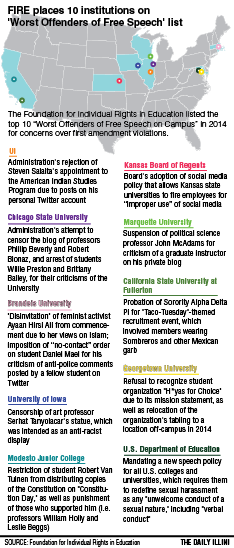FIRE’s 2014 'Worst Offenders of Free Speech' includes the University

March 10, 2015
The University was recently placed on the Foundation for Individual Rights in Education’s 2014 list of “10 Worst Offenders of Free Speech on Campus,” due to concerns of academic freedom on campus sparked by the rejected appointment of Steven Salaita.
A job offered to Salaita in the American Indian Studies program was revoked after he posted controversial tweets regarding the conflict in Israel and Palestine on his personal Twitter account.
FIRE is a nonprofit educational foundation that aims to defend and sustain individual rights at U.S. colleges and universities. Since 1999, the foundation has released an annual list, naming the top 10 educational institutions across the nation with first amendment violations.
Greg Lukianoff, president of FIRE, published the list on the Huffington Post on March 2, along with detailed reasons of why each institution was put on the list.
Nico Perrino, FIRE’s associate director of communications, said the organization receives about 700 submissions from students across the country, and also tracks student newspapers throughout the year to see what is happening on college campuses.
Get The Daily Illini in your inbox!
“It’s usually a list of the 10 worst colleges, although this year, we included two institutions that aren’t colleges, but that nonetheless had a huge impact on students’ free speech rights across the country,” Perrino said. “The only thing it usually results in is bad publicity.”
Perrino said the universities are always contacted prior to being put on the list, so an amicable solution for students and faculty alike can be considered.
However, if that neglects to happen, the issues are taken to the press and the “court of public opinion.”
“In each one of these cases, we have been in touch with the administrations to try and right what we perceive to be the wrong before we put them on the list,” Perrino said. “But, all the universities on the list either didn’t respond to us, or didn’t take our concerns seriously.”
The University denied claims that it had violated free speech in the case of Salaita.
“This is the kind of free discussion that is the bedrock of our institution and all of higher education,” said University spokeswoman Robin Kaler in an email. “Anyone who has witnessed the vigorous and passionate debates that have taken place and are still taking place on our campus would appreciate that there is plenty of space for freedom of expression and opinion.”
Salaita’s rejected appointment stimulated a chain of frequent discussions and workshops concerning academic freedom on campus, by organizations such as the American Association of University Professors, while the Committee on Academic Freedom and Tenure was assigned to investigate Salaita’s case.
Meanwhile, Salaita became an activist for academic freedom on university campuses. He gave a series of talks on his rejected appointment throughout October at Chicago universities including Northwestern University, DePaul University and Columbia College.
In January, Salaita filed a federal lawsuit against the University administration, claiming his constitutional rights were violated after his employment offer was denied, to which administration responded by motioning for the case’s dismissal.
Bruce Levine, history professor and supporter of Salaita, said in an email that he is deeply sorry and ashamed that the University appears on a list of the country’s worst offenders, but believes it deserves to be there.
“The University’s withdrawal of a faculty position previously offered to and accepted by Dr. Steven Salaita does constitute one of the worst and most serious attacks on campus free speech that has taken place not only this year, but in many years,” Levine said.
He also said he expects the American Association of University Professors will publicly censure the University at its national meeting this June.
“That censure will seriously damage our ability to recruit the best scholars to serve on our faculty in the future,” Levine said. “But, once again, it will be a damage that the chancellor and the trustees will have brought down upon us.”
Other institutions that appeared on the list include Brandeis University, University of Iowa, Modesto Junior College, Chicago State University, California State University at Fullerton, Georgetown University, Kansas Board of Regents, Marquette University and the U.S. Department of Education.






